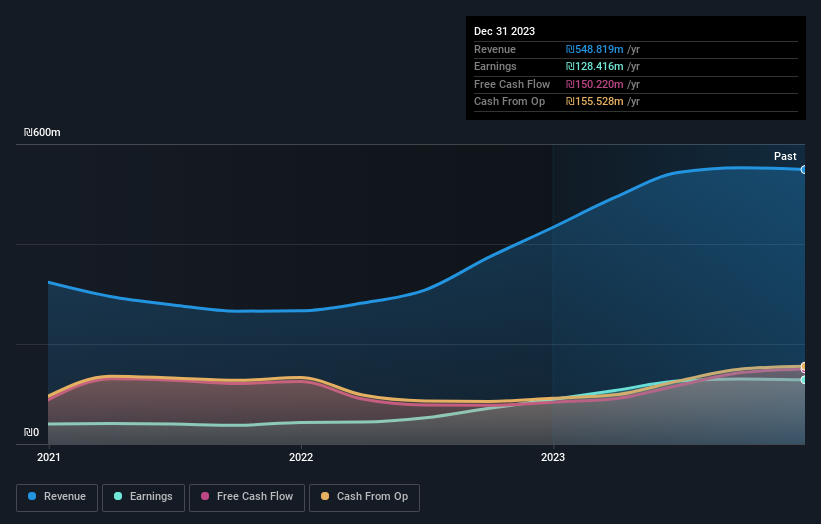- Israel
- /
- Electronic Equipment and Components
- /
- TASE:TLSY
The recent pullback must have dismayed Telsys Ltd. (TLV:TLSY) insiders who own 31% of the company

Key Insights
- Telsys' significant insider ownership suggests inherent interests in company's expansion
- A total of 4 investors have a majority stake in the company with 53% ownership
- Institutional ownership in Telsys is 16%
A look at the shareholders of Telsys Ltd. (TLV:TLSY) can tell us which group is most powerful. And the group that holds the biggest piece of the pie are individual insiders with 31% ownership. That is, the group stands to benefit the most if the stock rises (or lose the most if there is a downturn).
As market cap fell to ₪1.8b last week, insiders would have faced the highest losses than any other shareholder groups of the company.
Let's delve deeper into each type of owner of Telsys, beginning with the chart below.
Check out our latest analysis for Telsys

What Does The Institutional Ownership Tell Us About Telsys?
Institutional investors commonly compare their own returns to the returns of a commonly followed index. So they generally do consider buying larger companies that are included in the relevant benchmark index.
As you can see, institutional investors have a fair amount of stake in Telsys. This can indicate that the company has a certain degree of credibility in the investment community. However, it is best to be wary of relying on the supposed validation that comes with institutional investors. They too, get it wrong sometimes. It is not uncommon to see a big share price drop if two large institutional investors try to sell out of a stock at the same time. So it is worth checking the past earnings trajectory of Telsys, (below). Of course, keep in mind that there are other factors to consider, too.

Telsys is not owned by hedge funds. Arledan Investments Ltd. is currently the largest shareholder, with 22% of shares outstanding. In comparison, the second and third largest shareholders hold about 20% and 6.7% of the stock. Additionally, the company's CEO Elyashiv Dekel directly holds 1.1% of the total shares outstanding.
To make our study more interesting, we found that the top 4 shareholders control more than half of the company which implies that this group has considerable sway over the company's decision-making.
While studying institutional ownership for a company can add value to your research, it is also a good practice to research analyst recommendations to get a deeper understand of a stock's expected performance. Our information suggests that there isn't any analyst coverage of the stock, so it is probably little known.
Insider Ownership Of Telsys
While the precise definition of an insider can be subjective, almost everyone considers board members to be insiders. The company management answer to the board and the latter should represent the interests of shareholders. Notably, sometimes top-level managers are on the board themselves.
Most consider insider ownership a positive because it can indicate the board is well aligned with other shareholders. However, on some occasions too much power is concentrated within this group.
Our most recent data indicates that insiders own a reasonable proportion of Telsys Ltd.. It has a market capitalization of just ₪1.8b, and insiders have ₪564m worth of shares in their own names. It is great to see insiders so invested in the business. It might be worth checking if those insiders have been buying recently.
General Public Ownership
With a 30% ownership, the general public, mostly comprising of individual investors, have some degree of sway over Telsys. While this group can't necessarily call the shots, it can certainly have a real influence on how the company is run.
Private Company Ownership
We can see that Private Companies own 22%, of the shares on issue. It might be worth looking deeper into this. If related parties, such as insiders, have an interest in one of these private companies, that should be disclosed in the annual report. Private companies may also have a strategic interest in the company.
Next Steps:
It's always worth thinking about the different groups who own shares in a company. But to understand Telsys better, we need to consider many other factors. Be aware that Telsys is showing 3 warning signs in our investment analysis , you should know about...
Of course this may not be the best stock to buy. Therefore, you may wish to see our free collection of interesting prospects boasting favorable financials.
NB: Figures in this article are calculated using data from the last twelve months, which refer to the 12-month period ending on the last date of the month the financial statement is dated. This may not be consistent with full year annual report figures.
Valuation is complex, but we're here to simplify it.
Discover if Telsys might be undervalued or overvalued with our detailed analysis, featuring fair value estimates, potential risks, dividends, insider trades, and its financial condition.
Access Free AnalysisHave feedback on this article? Concerned about the content? Get in touch with us directly. Alternatively, email editorial-team (at) simplywallst.com.
This article by Simply Wall St is general in nature. We provide commentary based on historical data and analyst forecasts only using an unbiased methodology and our articles are not intended to be financial advice. It does not constitute a recommendation to buy or sell any stock, and does not take account of your objectives, or your financial situation. We aim to bring you long-term focused analysis driven by fundamental data. Note that our analysis may not factor in the latest price-sensitive company announcements or qualitative material. Simply Wall St has no position in any stocks mentioned.
About TASE:TLSY
Telsys
Telsys Ltd. markets and distributes electronic components in Israel.
Flawless balance sheet with proven track record.
Market Insights
Community Narratives



